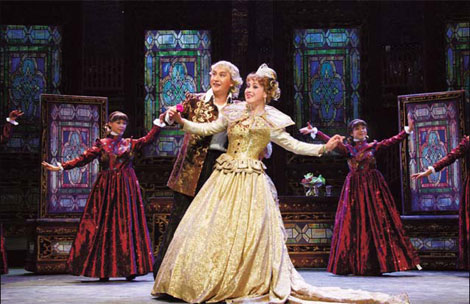Art
Afternoon at the opera
Updated: 2011-01-25 07:52
By Mu Qian (China Daily)
|
Night Banquet in the Palace, adapted from a foreign story, is a part of Guangzhou Cantonese Opera Company's gala show Dazzling Colors of Canton. Provided to China Daily |
All the singers will usually come down from the stage, at the end of his or her part, to chat with the spectators, many of whom they have known for a long time. The audience also tips their favorite singers.
The Zhujiang Quyi Troupe that performs at Datong Jiujia is a private company made up of retired performers from government troupes and amateur-turned-professionals.
According to the company's president Chen Shurong, some singers can earn more than 10,000 yuan a month from just tips.
"Official troupes often find it difficult to attract audiences, but Cantonese Opera does very well in restaurants where private troupes perform," he says. "It's because we do it in the traditional way, which people like."
But he admits that nowadays it's mostly elderly people who come to appreciate Cantonese Opera, and generally speaking, the art form is in decline.
According to historical records, Cantonese Opera began to appear in the 16th century, having evolved from Nanxi (a kind of opera) brought by immigrants from Hangzhou when the Southern Song Dynasty (1127-1279) came to an end.
Today, Cantonese Opera is appreciated mainly in the Cantonese-speaking areas of China, including Guangdong, Guangxi, Hong Kong and Macao. However, since large numbers from Guangdong have settled abroad, Cantonese Opera is among the widely known forms of Chinese opera overseas and can be found all over the world, especially in Southeast Asia, North America and Europe.
Founded in the 19th century, the Bahe Huiguan of Guangzhou is a traditional guildhall for Cantonese Opera practitioners, where artists from all over the world come to pay tribute. It used to play an important role in the development of Cantonese Opera but now mainly functions as a gathering place for retired performers in Guangzhou.
Ching May-bo, a Hong Kong scholar and a professor with the Department of History at Guangzhou's Sun Yat-sen University, says Cantonese Opera is in a better situation in Hong Kong than in Guangzhou, because it is regarded as part of elite culture by the middle class in Hong Kong.
But in Guangzhou, Cantonese Opera is mostly limited to elderly folks, with middle-aged and young people having less knowledge about this art form because of the "cultural revolution" (1966-1976).
Another difficulty, Ching believes, is that there are few new works that appeal to younger audiences while holding fast to its opera traditions.
"Nowadays many people talk about the crisis of Cantonese Opera. This may be a good thing in the sense that people are realizing the condition of this traditional art and want to do something about it," she says.
In September 2009, Ching founded a studio for the research of Cantonese Opera and folk music at Sun Yat-sen University to study this opera as well as promote it among young people.
Ching finds that although Cantonese Opera seems to be declining in Guangzhou, it is flourishing in some less-developed areas of Guangdong province like Zhaoqing and Zhanjiang, especially in the countryside. When a temple is built in rural areas, the village will usually invite a troupe to perform Cantonese Opera, which is considered a necessary part of the ceremony.
Ching's studio has also been operating a training course for college students, and it is generating much interest among the youth.
"Many young people are drawn to Cantonese Opera because of their strong emotional ties with Cantonese culture," Ching says.
"Although Cantonese Opera doesn't have as many followers as in the past because of the numerous entertainment options we have today, I believe it will always have its place."
Specials

President Hu visits the US
President Hu Jintao is on a state visit to the US from Jan 18 to 21.

Ancient life
The discovery of the fossile of a female pterosaur nicknamed as Mrs T and her un-laid egg are shedding new light on ancient mysteries.

Economic Figures
China's GDP growth jumped 10.3 percent year-on-year in 2010, boosted by a faster-than-expected 9.8 percent expansion in the fourth quarter.
